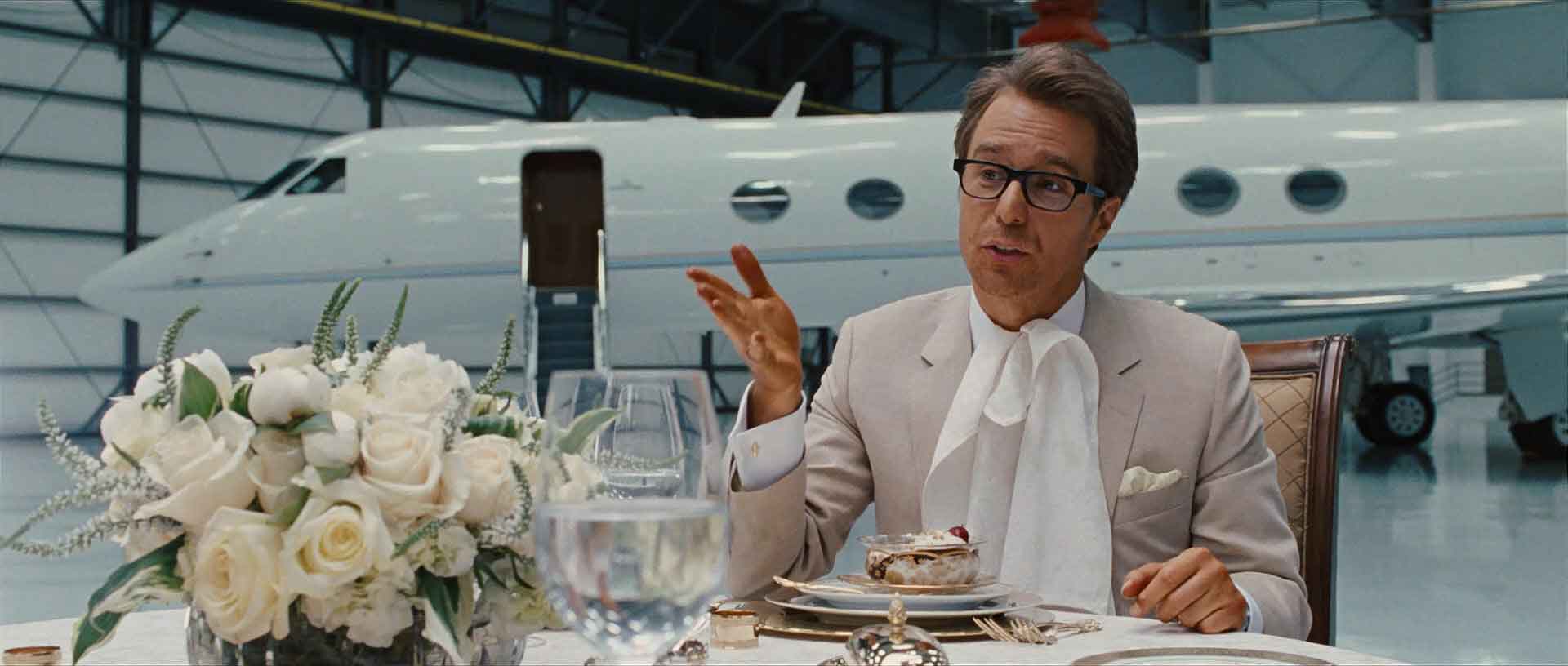Iron Man, Marvel Studios’ first film production, ended on a rather peculair note as far as superhero movies go. Instructed to read out a scripted statement to the press, an egotistical Tony Stark blurts out an impromptu line declaring himself as Iron Man. In doing so, he sort of becomes the first (major) cinematic superhero to actually reveal his identity instead of continuing to hide it under the garb of his superhero suit. You’d think that the most conventional route for a sequel to take would be to somehow take this moment back. Instead, writer Justin Theroux and director Jon Favreau together with producer Kevin Feige build upon this moment, exploring what it would mean to have a superhero with his identity so out there in the open.
That’s actually one of the better things about Iron Man 2, which just so happens to be the first sequel in the Marvel Cinematic Universe, really a strong sign of how good things were going for the nascent production arm its parent company had sprung up in 2006. With the world aware of Tony Stark’s secret identity as the Iron Man, what’s the most logical direction its story could flow? He’d acquire newfound fame and, being the self-centered narcissistic billionaire that he is, would certainly bask in the glory of the revelation, pulling off antics like no one else. The government would be out to acquire this radical piece of tech that could revolutionize warfare, giving soldiers a safe haven to fight behind. And enemies would spring out, either jealous of or angry at Stark’s newly acquired reputation or maye both.
And as if ticking all the boxes, that’s exactly where the creators of this movie take the story. You have Stark going larger than life, securing permissions from the Department of Defence just to stage a suave, stylish and smooth landing at the Stark Expo, which he revives after being announced by his late father Howard in 1974. You have Senator Stern and rival Justin Hammer coercing Stark to hand over his trade secrets so that it can be weaponized and mass-produced in a good way. You have Ivan Vanko, son of Anton Vanko who was Howard Stark’s colleague angry at his father having to die in poverty when he co-created the arc-reactor tech that powered Stark’s suit and essentially gave him his fame. And to top it all, the filmmakers throw in the dilemma of Stark being poisoned by the Palladium in the arc-reactor’s core, thus making the very thing saving him also the one that’s slowly killing him. Quite an ingenious mix of elements for a plot outline there, right? Which is why it’s perplexing that Iron Man 2 falters to a large extent, despite having such an abundance of riches.
The thing that doesn’t work in favor of Iron Man 2 isn’t really its technical flourishes that make its visual effects and CGI work indistinguishable from reality (really, just check out the Monaco Grand Prix and the climactic Stark Expo showdown sequences). It’s not even the smooth cinematography by Matthew Libatique, or the competent editing by Dan Lebenthal that keeps things running tight at just over 2 hours, or even the music by John Debney and Tom Morello which, despite being a step down from Ramin Djawadi’s iconic score, still gets the job done. From a production standpoint, Iron Man 2 is a resounding success, and also Marvel Studios’ first ever $200 million production, a budget that would serve as a test for its future movies. It’s like everything comes together seamlessly, with little bits and pieces thrown into the foley sound effects, camerawork and other surprises to make this a massive success. Heck Oracle CEO Larry Ellison and Tesla, SpaceX CEO Elon Musk themselves cameo in the movie, making them official members of the MCU.

What didn’t work for Iron Man 2 is some of the other elements it threw into the script to flesh out its larger universe and give audiences the sense that there’s a lot more going on behind the scenes that’s all building up to something. Samuel L. Jackson’s Nick Fury along with his S.H.I.E.L.D. subplot is the biggest detriment here, his appearance derailing the film’s main plot and throwing it completely off course, even if it’s important in giving viewers a taste of what’s to come. Things also feel a lot more disjointed in this sequel compared to the original, with plot developments not connecting as well as they should, which is strange given how Iron Man was basically written by as many as four writers, vs one for Iron Man 2. And the general effort of going bigger and busier, a mistake sequels often make, hampers the emotional connect one ought to feel when its main lead is slowly dying, succumbing to alcoholism and alienating his friends to combat what he believes is his ultimate and inevitable fate.
Of course that doesn’t take away the importance of Iron Man 2 one bit. For one, its dishonorable elements are sort of what make it important in the grand scheme of things. It’s the first MCU movie to give Nick Fury a proper role, and at least help us begin to understand the kind of battle-hardened soldier he really is. It also gives a much more tangible sense of the Avengers Initiative when Nick Fury presents his “recruitment” report, hiring Stark as a “consultant”, whose first job is to try and convince General Ross to include a certain member in ther new team at the end of The Incredible Hulk. Consequently, the ending of Iron Man 2 sheds more light on that of the MCU’s only solo Hulk movie.
Then there are the nifty easter eggs, hinting at the presence of other superheroes in the film. I’m going to exclude the Black Widow here since, more than being a reference, she’s an active part of the script played by then universe newcomer Scarlett Johannson with finesse (in both acting and action). Phil Coulson is “reassigned” to a gig in New Mexico through a dialogue that Clark Gregg was handed over at the last minute. Tony Stark’s remarks, referring to Mexico as the “land of enchantment” are particularly amusing, given that exact quote appears as Coulson’s license plate when he reaches the spot in Mexico where they’ve found Thor’s Hammer, Mjolnir. There’s a less than subtle nod this time to Captain America when a broken, prototype shield of his is used by Stark in synthesizing his new element in a rather amusing way. More recent interviews have sort of retroactively confirmed the identity of the young kid who Stark saves as Peter Parker, making this quite significantly, the first appearance of Spider-Man in the MCU to a certain extent. And in the mother of all references, Black Panther’s home nation of Wakanda can be seen in the map of Africa behind Nick Fury in his final scene recruiting Stark, where the university sequence from the Hulk also happens to be playing, setting The Incredible Hulk concurrent to the events of Iron Man 2.
Both of Jon Favreau’s Marvel movies have often had an improvisational quality to them and it’s present in spades in Iron Man 2. Whether it’s the tongue-in-cheek introduction of Don Cheadle as Rhodey, very slyly acknowledging his casting replacement, or even the banter shared between Pepper and Tony or Rhodey and Tony or Hammer and anyone, there’s a sense of unscriptedness to the proceedings that just adds to the naturalism of the goings-on. And I also find it interesting how the busy script actually adds some value to characters in unique ways, particularly in how rich and textured Justin Thereoux’s dialogue is. Whether it’s the opening senate hearing or Hammer’s weapon exposition to Lieutenent Colonel Rhodes, characters here aren’t boring or by the numbers but have their small, unique traits and quirks that make them all stand out, their emotional shallowness aside. It’s one of the things I guess that salvages Iron Man 2 from being labelled an outright disaster, which I promise you it is far from.
On the whole then, Iron Man 2 is probably the movie by which Marvel Studios perfected the art of commercial cinema. It’s the kind of film you can safely watch in theaters, guaranteed that you’ll have a good time, and even appreciate the nuances, easter-eggs and layered and laden dialogue upon subsequent rewatches. Sure, you’re not going to feel sorry or sad for Tony Stark even in his saddest moments and it’s not going to move you like Iron Man did but it’s the kind of perfect big-budget filmmaking that passes off as polished entertainment. And in doing so, it nicely peppers its running time with hints and teases of plot elements to come in the larger world that Marvel is building with its Cinematic Universe.
If there was a time for doing something different then, it would be now, as Marvel Studios would prove with its next venture.
In this Appocalypse weekly series titled The Road to Avengers: Endgame, we take a look at all the Marvel Cinematic Universe movies leading up to the release of Avengers: Endgame with a specific focus on the importance of the movies in the MCU pantheon. These pieces may be laden with spoilers so read carefully.





